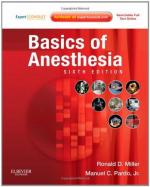|
This section contains 1,243 words (approx. 5 pages at 300 words per page) |

|
The term "anesthesia" refers to insensibility to pain. Efforts to ease or eliminate pain are as old as pain itself. The early Chinese used both acupuncture and Indian hemp to dull the perception of pain. Ancient Hindu civilizations used henbane and wine as well as hemp. The Romans experimented with mechanical methods of producing unconsciousness: pressing on the carotid artery in the neck or controlled bleeding from arteries in the wrist. In the first century a.d. the Greek physician Dioscorides (40-90 a.d.) described the use of wine of mandragora (mandrake) to produce a deep sleep in surgical patients and used the Greek "anesthesia" to describe the phenomenon. Pliny (23-79 a.d.) also mentioned the use of mandragora. The Greek poet Homer referred to the pain-killing effects of nepenthe, and the Greek hisotrian Herodotus wrote of hemp fumes. Alcohol--wine and brandy--was widely used by early peoples for...
|
This section contains 1,243 words (approx. 5 pages at 300 words per page) |

|


